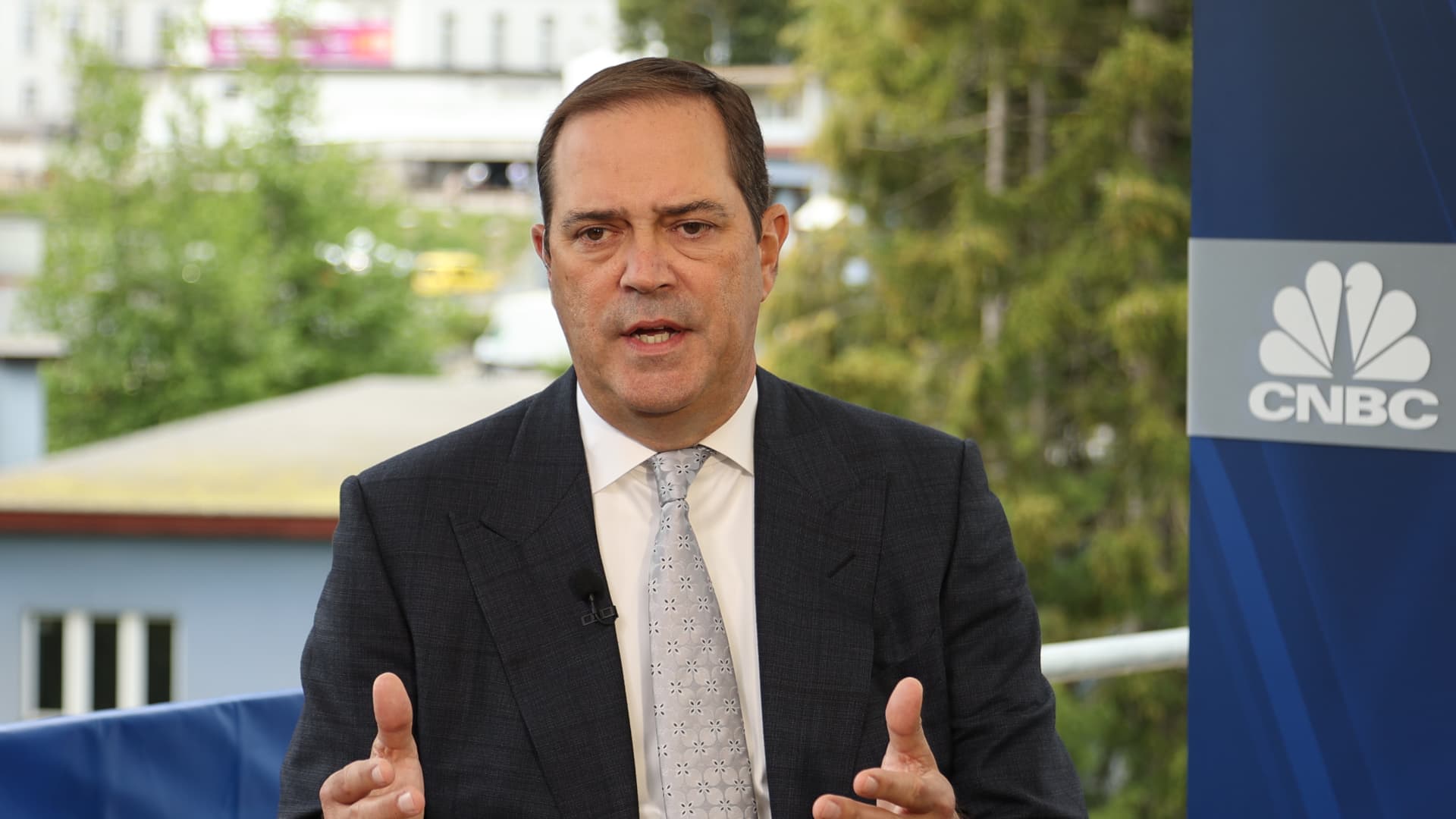
Chuck Robbins, CEO of Club holding Cisco Systems (CSCO), provided a number of updates Wednesday on the networking company’s business, including how the easing of Covid lockdowns in major Chinese cities is impacting supply chains. Here’s a recap of what Robbins told Jim Cramer in an exclusive interview Wednesday night. Supply chains Cisco, like so many other tech hardware firms, has been plagued by supply chain issues throughout the Covid pandemic. That continued to be a drag on revenue in the company’s quarter ended April 30, which it reported May 18 . Lockdowns in China, which began in late March, contributed to those supply chain snarls. However, Robbins said Wednesday that Cisco is seeing incremental improvements, as strict Covid restrictions have started to ease in places like Shanghai, the most populous city in China. “The China thing was pretty straightforward. The issue is … we were the first company that had experienced the full month of April, and we saw a lot of our peers come out afterward and had the same issues. It is temporary. … We’re staring to feel the fact they’ve opened up some, and hopefully we’re going to begin to see that flow through. I think that’s a temporary issue.” Among the critical components that Cisco has been struggling to get are power supplies, and the absence of them prevented products from being shipped out of China to customers. Robbins didn’t specifically address power supplies Wednesday. However, he said Cisco’s supply chain is benefitting from other trends in tech hardware, specifically an overall slowdown in PC sales . “We’re still cautious, but there are a few other positive signs we’re beginning to see in the supply chain side of things. … You’re seeing some components that are becoming available because of [PC demand weakening], some of the stuff that we all kind of go after together,” Robbins said. M & A update Cisco is no stranger to making acquisitions to grow and enhance its product offerings, especially in cloud-based software . Many technology companies have seen their stock valuations tumble since late last year, prompting speculation that some firms may become more attractive takeover targets. Robbins said Cisco, which has a market cap around $186 billion, has not changed its acquisition strategy over the past few months. What has changed, Robbins said, is the potential willingness of certain companies to be bought. Cisco ended the April quarter with $20.1 billion in cash and short-term investments. “We always have 15, 20, 30 companies that we’re floating and watching and looking at. Doesn’t mean we think they’re all great fits, but we want to understand more about,” Robbins said. “Hopefully there will be some opportunities that will come about at more reasonable valuations. … There’s absolutely a lot of opportunity out there right now.” Demand picture As noted above, Cisco management stressed last month that supply chain problems were the main reason for its quarterly revenue and guidance coming in lighter than expected. We’re paying close attention to what Cisco says about demand, however, because of the company’s large exposure to enterprise customers. Given all the concerns about a potential recession, it’s important to monitor what businesses are doing with their money. On May 25, Robbins said Cisco had not “seen anything from a demand perspective that would signal we’re heading into some recession.” We wrote about those comments at the time , explaining Cisco’s role as an harbinger for economic slowdown ahead of the Great Recession. Robbins said Wednesday he is “fairly optimistic” with his outlook, adding that demand from some of the Cisco’s important hyperscale cloud customers has “stayed very steady, if not gone up significantly.” “I’m not confused that things could get a little rocky in the short term, but I feel good about where we are. I feel good about the markets we’re participating in. I feel good about the importance of the technology to our customers, so we’re just going to keep executing,” he said. In general, Robbins said he believes executives are well aware of the macro headwinds that have created a difficult business environment in recent years. Those challenges include trade wars started under former President Donald Trump, the Covid pandemic and now the highest inflation in decades, Robbins said. “I think customers on the enterprise space — now, the consumers is a different issue — in the enterprise space, this is just kind of normal for them. I don’t think they overreact like they might have 15 years ago where you just cut off spending because they realize six months, 12 months from now, the need for the infrastructure or the technology modernization or whatever it is they need to invest in, they realize that’s still going to be there,” Robbins said. “Now, could they delay a little bit? Yes, but I don’t get the sense that there’s going to be this extended lull because customers are concerned about their competition spending ahead of them and creating differentiation.” (Jim Cramer’s Charitable Trust is long CSCO. See here for a full list of the stocks.) As a subscriber to the CNBC Investing Club with Jim Cramer, you will receive a trade alert before Jim makes a trade. Jim waits 45 minutes after sending a trade alert before buying or selling a stock in his charitable trust’s portfolio. If Jim has talked about a stock on CNBC TV, he waits 72 hours after issuing the trade alert before executing the trade. THE ABOVE INVESTING CLUB INFORMATION IS SUBJECT TO OUR TERMS AND CONDITIONS AND PRIVACY POLICY , TOGETHER WITH OUR DISCLAIMER . NO FIDUCIARY OBLIGATION OR DUTY EXISTS, OR IS CREATED, BY VIRTUE OF YOUR RECEIPT OF ANY INFORMATION PROVIDED IN CONNECTION WITH THE INVESTING CLUB. NO SPECIFIC OUTCOME OR PROFIT IS GUARANTEED.



